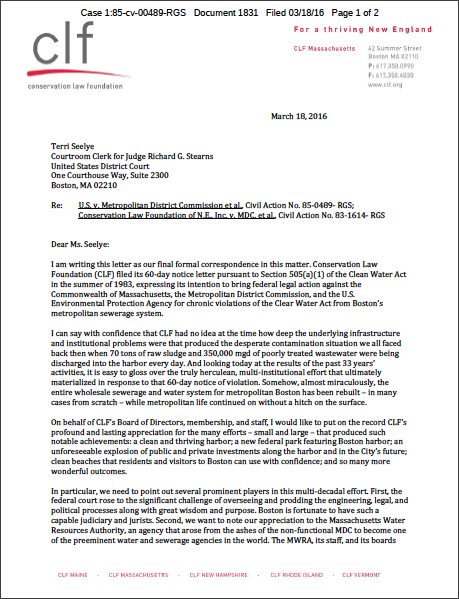 On Friday, March 18, 2016, Federal District Court Judge Richard G. Stearns will formally receive the Massachusetts Water Resources Authority’s final Combined Sewer Overflow (CSO) Annual Progress Report in a hearing at the Moakley Courthouse. MWRA has filed the report every year since 1988, in compliance with the Boston Harbor Cleanup Case and has now met the last court-ordered construction milestones in December 2015.
MWRA’s $900 million CSO control program began in 1987, when Boston Harbor was considered the dirtiest in the nation. In addition to the region’s failed wastewater treatment facilities, 84 active and uncontrolled CSOs discharged 3.3 billion gallons a year of combined sewer overflows into Boston Harbor and its tributaries ‒ the Charles, Mystic and Neponset Rivers – and onto its beaches.
Combined sewers are common in older cities and were designed decades ago to relieve the sewer system during heavy rain storms. The 35 projects in MWRA’s program were designed to bring CSO discharges in Boston, Brookline, Cambridge, Chelsea and Somerville into compliance with federal and state water quality standards. The design and construction milestones for these projects were set in the federal court schedule.
Nearly 100 miles of new storm drain and sewer pipes have been installed. Four treatment facilities have also been constructed or upgraded to treat discharges and thirty-four CSO outfalls have now been permanently closed. The annual volume of CSO discharges has been reduced by 3 billion gallons, with 93 percent of the remaining flows receiving treatment.
“Boston Harbor’s beaches are considered the cleanest urban beaches in the country and the water quality in the Charles and Mystic Rivers is better than ever due to the great work of MWRA’s Combined Sewer Overflow program,” said Secretary of Energy and Environmental Affairs Matthew Beaton, who also serves as chairman of MWRA’s Board of Directors. “These CSO projects, and the many people who have worked on them since 1987, have been vital in protecting these beautiful natural resources and the health and quality of life of Boston-area residents.”
MWRA’s report (PDF) provides the details of the program, which included 35 separate projects – 82 construction contracts, 33 engineering contracts, and 10 planning and technical assistance contracts – necessary to meet 184 court milestones and bring MWRA into compliance with the Federal Clean Water Act and Massachusetts Surface Water Quality Standards. Over the next five years, MWRA will develop and implement an assessment program to ensure the long-term effectiveness of the program.
“The work of the MWRA and the CSO communities has often been difficult and under a tight schedule, but every project has now been completed – and on time,” said Judge Stearns. “Every man and woman who has worked on any of these projects can take great pride in a job well done, with results that directly benefit the people, the environment and the economy of the region.”
“We’ve come a very long way from the days when a dip in the Charles resulted in a trip to the hospital,” said MWRA Executive Director Fred Laskey. “The CSO program has ensured that residents now have access to clean urban rivers and beaches, even in wet weather. These are real quality of life improvements for those who live, work and play near the waterfront.”
Related Links:
CSO Control Program Annual Progress Report for 2015 (PDF)
All CSO Control Program Annual Progress Reports
MWRA CSO Control Program |

